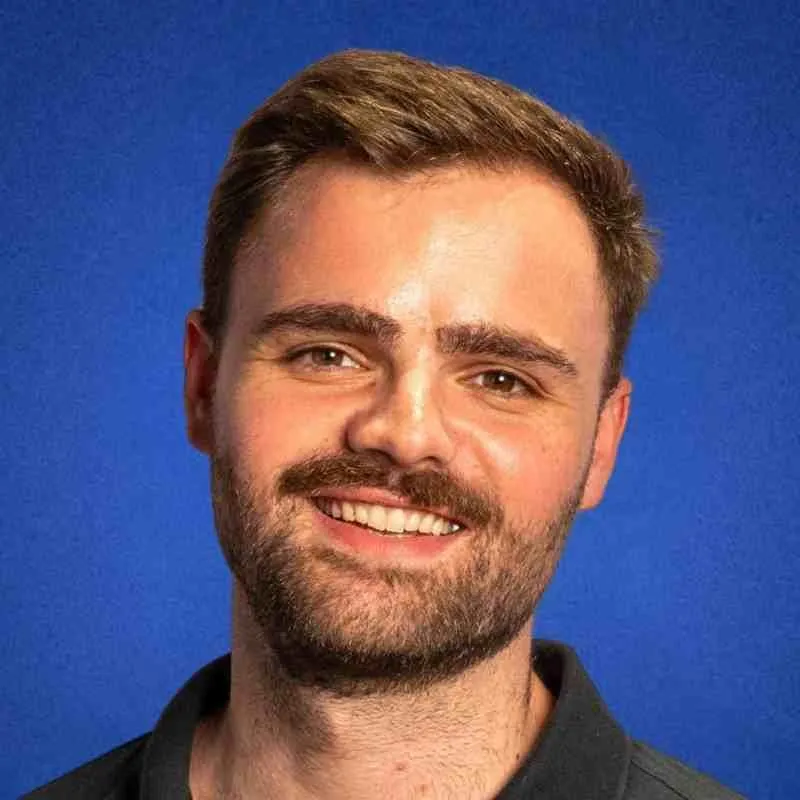

Charlie Hills
Founder of Linked Agency
Topic: How I vs How To: The LinkedIn Strategy That Turns You Into a Lead Magnet
Audio Only
AI Transcript
Bill Ross: Today's guest is Charlie Hills, founder of Linked Agency and an AI marketing strategist who helps business leaders use LinkedIn as a growth engine to drive attention and build sales pipelines. He delivers actionable frameworks that turn engagement into real business growth.
Charlie, welcome to our expert interview series.
Charlie Hills: Thank you so much for having me, Bill.
Bill Ross: Yeah, I'm looking forward to it. So, since this is a very short, quick, strategy-based session to get that out to our listeners, I'm gonna jump straight into the question, which is, what is the most effective strategy you recommend for business owners to increase sales while also strengthening their company's reputation?
Charlie Hills: Hmm… Yeah, I really love this question, because in the age of AI content, it's so easy to post online, but I still think it is the most effective way to grow your business in the long term.
It does take a long time to build up a personal brand, especially on LinkedIn, but I think it pays definitely the most dividends in the long run. If you're looking for short-term wins, then I'd advise social selling and targeted outreach.
But if you combine the two, personal branding with outreach, then that is the best way to fill your pipeline with leads.
Bill Ross: Gotcha. So, let me ask you real quick, you say personal branding, which is interesting, because a lot of businesses, you know, depending on, I guess, the age of the founder at this point in time, right? If they're on the younger side, they might very well understand that concept of a personal brand to help fuel the business, whereas maybe somebody a little bit older might not quite understand that concept, so maybe you could clarify the whole idea of a personal brand, and specifically how that relates on LinkedIn, right?
Charlie Hills: So yeah, a personal brand is basically just your personal identity, shared online, and LinkedIn is probably one of the best platforms for that, because it's connected to your actual profile, your university, your, you know, your whole life, your whole career.
And so, for anyone who doesn't know, it's just… it's basically you. just posting online. I think we're kind of entering a… new stage of personal branding. Prior to, you know, 2020 onwards, it was very much like only celebrities we saw. And then it was kind of like these mega influencers on YouTube, etc.
Now we're actually seeing a huge surge in the amount of just regular folks who post content online and generate leads for their business as a result of it.
Bill Ross: So it's leveraging that personal brand, building a relationship with the community. Converting those people into business clients, essentially, is that correct?
Charlie Hills: Yeah, exactly that. It's just posting content, in simple terms.
Bill Ross: Gotcha, gotcha. So doing it as your personal self, as opposed to as your business posting, more or less, right?
Charlie Hills: Yes, exactly, exactly that. I mean, tons of people come to me and they say, we want to grow our company page. I'm like, why would you do that? You know, you've got a great, great personal brand here that you could grow instead, and it'll do a lot better, and it'll be way easier.
Bill Ross: So do you think, and that's an interesting sort of concept in the transition that you're sort of talking about since maybe 2020 and moving forward, do you think there is more of… a personal brand has that more direct human connection with people versus a corporate brand which has more of a cold, impersonal relationship with people. Do you think that's why the shift is occurring, and why the influence and the success under that personal brand is so much better?
Charlie Hills: Yeah, totally. I think people can relate to personal branding versus, yeah, company content, because if… you are an entrepreneur, a leader, then you can talk about that. Talk about how you became a CEO and lessons you've learned along the way, versus a company page, you can't really do that. You'll just share, you know, job updates, new hires, etc. It's very bland, whereas Personal branding, there's so much more that you can play with and just build that connection and community online with, so 100%.
Bill Ross: Gotcha. Okay, so you mentioned two strategies, a longer-term strategy and a shorter-term strategy, one being building that following, building that connection as your personal brand, which takes a little bit longer, and posting content. Can you give very quickly, because I don't want this to go too long, but can you give very quickly sort of what that strategy looks like as to how they build that brand, what type of content, that type of thing?
Charlie Hills: Sure, so it does take a long time, it's like 3-6 months starting traction, but ultimately, you are the content. Absolutely anything that's happened in your day could be a social media post.
And for me personally, it's very important to share how I versus how to, because anyone can go to ChatGBT now and generate 10 tips. No one can tell me Bill's top 10 tips for, you know, interviewing people.
So, that is basically the whole premise of personal branding. For me personally, I love to focus on top of the funnel with very broad appeal content, which garners a lot of attention.
But you could share case studies about successful client work, or, you know, bottom of the funnel posts as well. So, that's what I like to say to people, you are the content. Even… I can make a post about this conversation I've had with you today.
Bill Ross: Gotcha. So I think you just said something that was very interesting. You said you address it as how I versus how… what was the other part of it? How you, or how others, or what?
Charlie Hills: How to?
Bill Ross: How to, gotcha. How I versus how to. So, again, you're taking that personal brand, you're making it personal. This is how I do it specifically. I think that's fantastic. Okay, the second strategy you mentioned, the more quick-hit type of thing, I think was more that outreach side of things. Break that down just a little bit for me.
Charlie Hills: Sure, so tons of people come to me, and they want leads immediately, and I tell them, hey, you know, I don't think personal branding is the right game for you. So, if you want leads fast, then it's all about enriching data, finding the right prospects, and then targeting them with hyper-personalized messaging.
And that does take time and some experience to… to… to create. No one… not many people know how to use tools like Clay. It's quite complex.
And that's why I'd recommend working with, like, lead gen agencies, but… that's the key distinction. One's very much a short-term game. We want as many leads, and we're gonna blast as many emails and messages as possible, versus the other approach, which is, like, I'm gonna build a long-term reputation here. So, yeah, that's the difference.
Bill Ross: Okay, so when you… when you're talking about, obviously, email messages, cold email, I get that and understand it, but are you also talking about, sort of, that, you know, I think we all get the messages, those connection requests, and the message on LinkedIn that says, hey, you know, I'm so-and-so, I'd like to connect, and then 2 seconds later, you get a message that says, hey, this is what I do, why don't we have a conversation? Okay, so in that regard, if somebody wants to tackle that.
How do they not be that person that is spamming, that everybody looks at and goes, look, God, not another one of these, and they delete the message?
Charlie Hills: So the first approach is definitely combining that with personal branding, because when I reach out to people, they're way more likely to want to reply, because they recognize me, they see me on the feed. And also, it's not pitch lapping. That is the worst thing I see on LinkedIn, is a connection request, and like you just mentioned, it's just a cold pitch.
What you want us to do, ultimately, is just build relationships and be social on social media, and just have genuine conversations with people, rather than pitch-flapping them, because those conversations might actually reveal pain points or symptoms.
Which you can then, you know, follow up, ask more questions, and, just kind of understand where this person actually needs your services, rather than jumping the gun and going straight in there with the pitch.
Bill Ross: Great, great. I think the information you've given… has built a tremendous amount of clarity, I think, for a lot of people, and laid out a good strategy that people can follow, depending on what they're trying to accomplish. I think, if I had to encapsulate a little bit of what you said, it's really… the key is build that personal brand, even though it takes a little bit longer, and if you are trying for a more, you know, a quicker approach.
Do them simultaneously. Don't negate or ignore or not do the personal brand, because that's really your long-term strategy that works phenomenally. So, do I have that correct?
Charlie Hills: 100% Bill.
Bill Ross: Alright, perfect. Well, listen, Charlie, thank you for your time today. I really appreciate it. I do have one more quick question for you. That is simply, if people want to know more about you, or how they can get help from you, how do they reach you?
Charlie Hills: Well, LinkedIn is where I spend every single day, but beyond that, I'm on Substack too, and then also my company website, linkedagency.com.
Bill Ross: Beautiful. Alright, I appreciate that. We'll link that below for everybody. And, Charlie, it's a pleasure having you today. We'll chat with you soon.
Charlie Hills: Yeah, thank you so much, Bill.

